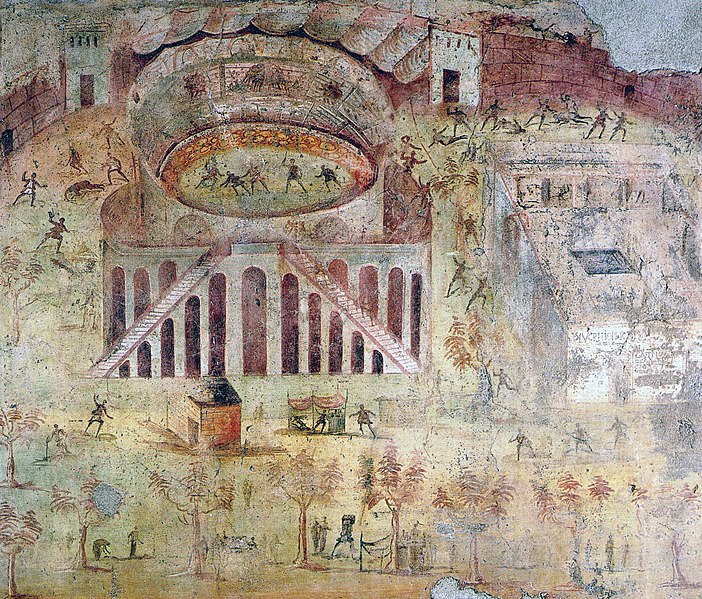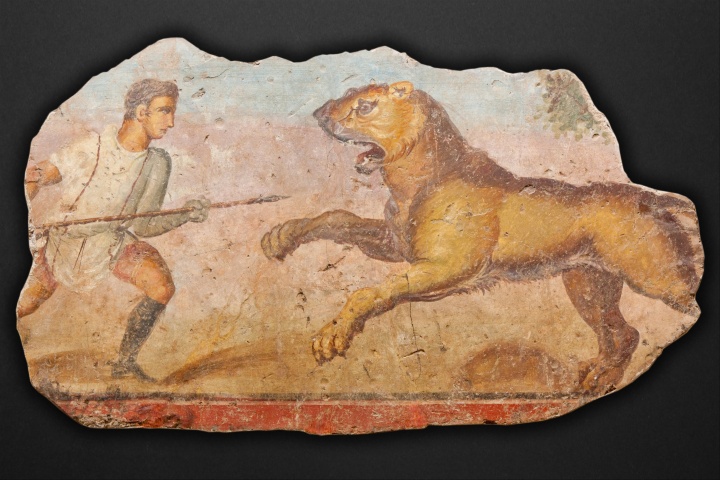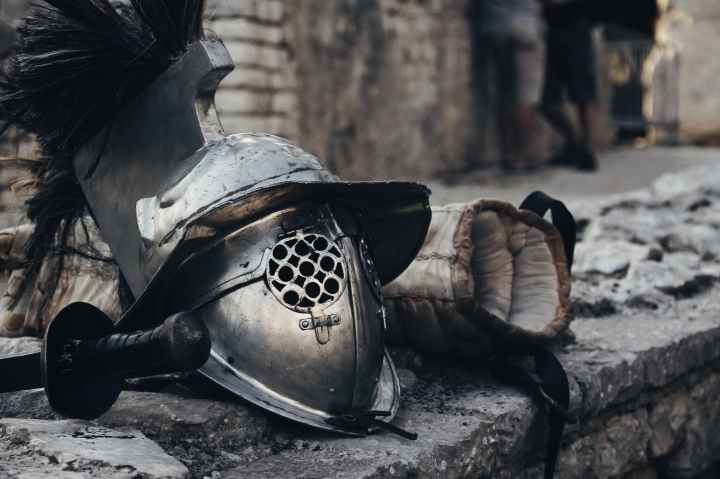The Glove and the Lions by Leigh Hunt seemed an apt choice for my poetry post this month, a ‘fit’ with my theme of ‘Kings and Queens’. There are after all, two kings in it–King Francis whose realm Hunt takes us to, and the lions, kings of their own realms, though in the human arena, they are mere prisoners, at the receiving end of much ill-treatment, and objects of ‘entertainment’ for their captors, rather than living beings.
The poem by Leigh Hunt immediately transports the reader into a world back in time, a world of kings, queens, and knights, of chivalry and courage, but also of things that weren’t the best part of that world. The poem is set in an arena, where a battle between lions has been organised, to ‘entertain’ the court, with King Francis, ‘a hearty king‘ who ‘loved a royal sport‘ sitting down to watch among his nobles, who include the Count de Lorge and the ‘one for whom he sighed‘.

Picture: Pompeii: Battle at the Amphitheatre
Source:By WolfgangRieger [Public domain], via Wikimedia Commons
The scene down in the pit below may well have been a ‘royal sport’ but even picturing it in one’s mind, and the image that Hunt’s description conjures up, for me is very much like the Roman arenas–and while there aren’t any gladiators here, animals are being made to fight each other, and there is obviously pain, and injury, and in all likelihood (though not explicitly mentioned) blood. These five lines of the second stanza that describe the scene down in the pit, bring alive the sights and sounds that one would have witnessed and heard–the blows, the thunderous roars, the sand, and froth–taking us right there amidst King Francis and his nobles.
“Ramped and roared the lions, with horrid laughing jaws;
They bit, they glared, gave blows like beams, a wind went with their paws;
With wallowing might and stifled roar they rolled on one another,
Till all the pit with sand and mane was in a thunderous smother;
The frothing foam above the bars came whisking through the air;”

Painting from the Amphitheatre: Man with a Lioness
Source:By Unknown – mQFpkLIpgXBDjw at Google Cultural Institute, zoom level maximum, Public Domain, https://commons.wikimedia.org/w/index.php?curid=29859501
Thinking about this scene makes one wonder what pleasure human beings could possibly get or what makes them get any pleasure from watching others (human or animal) fight each other, cause each other hurt–what makes them ‘enjoy’ others’ suffering? And is fighting the only way might or superiority or strength can be proved? And why really does it have to be proved?
But of course, the role of this scene in the arena in the poem is very different, probably not so much intended to make us reflect on humans and blood sport but more to set the scene for that other aspect of human nature that the poem is really talking about–vanity, supposed glory–valued by so many above feelings that really matter in the end. The scene down in the pit, the roaring lions, the froth, and blows are simply meant to convey the danger down below, King Francis remarking at the end of that second stanza, “Faith, gentleman, we’re better here than there“.
Count de Lorge’s beloved (we aren’t given names) however, seems to think otherwise, or at least value other things much above the love the Count has for her, for she has no qualms asking ,or rather quite literally challenging de Lorge to go down into the pit by throwing her glove down there, asking him to ‘prove his love‘ and bring her ‘great glory‘.
“She thought, ‘The Count my lover is brave as brave can be;
He surely would do wondorous things to show his love of me;
King, ladies, lovers, all look on; the occasion is divine;
I’ll drop my glove to prove his love; great glory will be mine.”

And so she does. de Lorge is not lacking in valour, certainly and immediately as he receives her ‘challenge’, not expressed in words, but simply conveyed by a look and a smile, he unhesitatingly and in a flash jumps into the pit, and retrieves her glove. But, wait! things do not quite turn out quite as the lady had envisioned. For the Count is not only brave but able to see the lady’s action for what it is. So fittingly,
“He bowed, and in a moment leaped among the lions wild:
The leap was quick, return was quick, he has regained his place,
Then threw the glove, but not with love, right in the lady’s face.”
The spell the lady has held over him thus stands broken, for while he might have loved her, she seemed to love glory more, and ends up receiving just the response she deserves. King Francis approves his Knight’s action:
“‘By Heav’n!’, said Francis, ‘rightly done!’ and he rose from where he sat;
‘Not love,’ quoth he, ‘but vanity, sets love a task like that.'”
So while Leigh Hunt takes us into the world of long ago, of knights and kings, of valour, chivalry, and of ‘royal’ sport, what he’s really showing us is human nature, leaving us with a couple of thoughts that make us question why we consider ourselves so very superior to other life, when we derive pleasure, even glory, from causing pain or danger to others (human or non-human); how we can claim to be ‘civilised’ when such (or at least some form of) blood sport continues even today; how we can claim to be ‘better’ than other creatures when all we value much of the time is fame, glory, (wealth), and power?
Love your thoughts on this!
LikeLiked by 1 person
Thank you 🙂
LikeLike
You’ve intrigued me with this poem, the subject matter of which seems more ancient but which may have applied in the Middle Ages too. Certainly tourneys and melees were popular in Europe, and Round Tables were actually arenas for such ‘entertainments’ (archaeological evidence exists for one such wooden structure being built in the 14th century within Windsor Castle). Also ‘lions’ could have been imported from North Africa though the term was also used for leopards and possibly lynxes.
But, yes, foolhardy valour like that described here is not really evidence of love, any more than any other risk taking for the sake of it. An interesting poem which I ought to search out; maybe it’s in my ancient Oxford treasury of poems…
LikeLiked by 1 person
🙂 Fights like these (between animals) or Roman arenas or even ‘sport’ like jousting really makes wonder why these and their like we thought entertaining. And yet they are– Risk taking for valour/glory still happens in different ways as well, and when one begins to think about it, one can’t help but wonder what’s the point?
I wonder about those lions–perhaps yes, they could have been some other big cats–there’s an interesting book in the Indian context that I came across (haven’t bought it yet) that talks about how Lions and Cheetahs were actually brought to the country from outside by Kings and such, and have now become native in a sense–though the hunts and fights are off-putting to read about to me, I enjoy reading how animals made their way around different parts of the world.
LikeLiked by 1 person
I was intrigued by the archaeological evidence that noted lynx bones in NE England in the late Anglo-Saxon period. Linked with a native Welsh poem (of possibly a couple of centuries later) about Arthur’s colleague Cai — Sir Kay as would be — fighting ‘lions’ in Anglesey, and I wonder when lynxes actually died out or, more likely, were exterminated in Britain.
I agree, fights to the death with animals or even humans for entertainment is barbaric. We seem to have ritualised and tamed it with competitive sport (football, rugby, judo, fencing) but then there’s still boxing — which aims to inflict deliberate pain on an opponent, and mixed martial arts aka cage fighting. And let’s not forget foxhunting, which despite strictures still goes on, the unspeakable in pursuit of the inedible.
LikeLiked by 1 person
Must look that up.
Slightly newer (sixteenth century, I think) was one of the Medici popes’ pet elephant which came I think from Asia–though in this case a pet, and a great favourite with the Pope, I don’t think he survived too long.
Boxing, Rugby, Foxhunting as you said- there are also bull fights, wrestling to an extent. But on a general level, i find myself questioning even individual achievements–climbing Everest even–or marathoning simply to prove one is capable, and or the ‘best’ or (strongest, or etc etc)–we do we attach so much to proving how ‘wonderful’ we are.
LikeLiked by 1 person